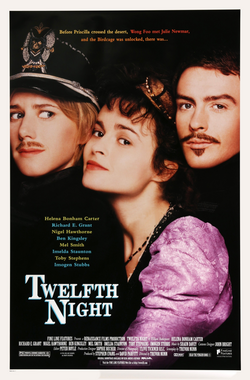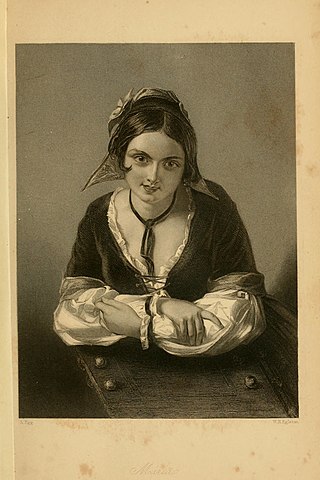
Twelfth Night, or What You Will is a romantic comedy by William Shakespeare that is believed to have been written around 1601–1602 as a Twelfth Night entertainment for the close of the Christmas season. The play centres on the twins Viola and Sebastian, who are separated in a shipwreck. Viola falls in love with the Duke Orsino, who in turn is in love with Countess Olivia. Upon meeting Viola, Countess Olivia falls in love with her thinking she is a man.

Sir Toby Belch is a character in William Shakespeare’s Twelfth Night. He is Olivia's uncle.

Malvolio is a fictional character in William Shakespeare's comedy Twelfth Night, or What You Will. His name means "ill will" in Italian, referencing his disagreeable nature. He is the vain, pompous, authoritarian steward of Olivia's household.
In British English, a prig is a person who shows an inordinately zealous approach to matters of form and propriety—especially where the prig has the ability to show superior knowledge to those who do not know the protocol in question. They see little need to consider the feelings or intentions of others, relying instead on established order and rigid rules to resolve all questions.

Feste is a fictional character in William Shakespeare's comedy Twelfth Night. He is a fool attached to the household of the Countess Olivia. He has apparently been there for some time, as he was a "fool that the Lady Olivia's father took much delight in" (2.4). Although Olivia's father has died within the last year, it is possible that Feste approaches or has reached middle age, though he still has the wit to carry off good 'fooling' when he needs to, and the voice to sing lustily or mournfully as the occasion demands. He is referred to by name only once during the play, in answer to an inquiry by Orsino of who sang a song that he heard the previous evening. Curio responds "Feste, the jester, my lord; a fool that the lady Olivia's father took much delight in. He is about the house" (2.4). Throughout the rest of the play, he is addressed only as "Fool," while in the stage directions he is mentioned as "Clown."

Twelfth Night is a 1996 romantic comedy film adaptation of William Shakespeare's play, directed by Trevor Nunn and featuring an all-star cast. Set in the late 19th century, it was filmed on location in Cornwall, including scenes shot at Padstow and at Lanhydrock House near Bodmin, with Orsino and his followers wearing uniforms that evoke the Austro-Hungarian Empire.

Twelfth Night is a 1955 Soviet comedy film by Lenfilm based on Shakespeare's play Twelfth Night, or What You Will. The script was written by Yan Frid. The film was released in the Soviet Union on 21 November 1955, and in the United States on 3 March 1956.

William Hamilton (1751–1801) was an English painter and illustrator.

Duke Orsino is a fictional character from William Shakespeare's play Twelfth Night, believed to have been written around 1600-1602.

Viola is the protagonist of the play Twelfth Night, written by William Shakespeare.
Music Is is a musical with a book by George Abbott, music by Richard Adler, and lyrics by Will Holt. It is the second musical adaptation of the William Shakespeare play Twelfth Night, following Your Own Thing in 1968.

Olivia is a fictional character from William Shakespeare's play Twelfth Night, believed to have been written around 1600 or 1601. She is at the centre of the various plots, both the comedic and the romantic. She has various suitors.

Illyria is a musical with book, music, and lyrics by Peter Mills, based on William Shakespeare's Twelfth Night, written in 2002. Illyria is a traditional adaptation of Twelfth Night, but features a more contemporary score.
Twelfth Night, or, What You Will is a videotaped 1988 television adaptation of Kenneth Branagh's stage production for the Renaissance Theatre Company of William Shakespeare's Twelfth Night first broadcast in the UK by Channel 4 on 30 December 1988. Made by Thames Television, in collaboration with Renaissance, it stars Frances Barber as Viola and Richard Briers as Malvolio. The recording was shot on a single set with the appearance of a wintry garden. The costumes are Victorian, and the time of year is Christmas.

Maria is a fictional character in the play Twelfth Night by William Shakespeare. She is a servant in Olivia's household. Maria is shown to have a friendly relationship with Sir Toby Belch, and exhibits a witty attitude. Maria also forges a love letter to Malvolio which results in Malvolio being confined to a dark room.

Sebastian is one of the main characters from William Shakespeare's play Twelfth Night, believed to have been written around 1600 or 1601.
Twelfth Night is a 1986 Australian film based on the play directed by Neil Armfield and starring Gillian Jones, Ivar Kants, and Peter Cummins.
"Twelfth Night" is the 41st episode of the second season of the Australian anthology TV series Wednesday Theatre and is based on the play of the same name by William Shakespeare. "Twelfth Night" aired on ABC Television network on 12 October 1966 in Sydney, on 26 October 1966 in Melbourne, and on 16 November 1966 in Brisbane. The play was directed by Ken Hannam and it starred Roger Climpson and Helen Morse.
"Twelfth Night" is a 1970 British TV adaptation of the play Twelfth Night by William Shakespeare. It was directed by John Sichel and broadcast as the 44th episode of second season of ITV Sunday Night Theatre. The score was composed by Marc Wilkinson.

Twelfth Night is a 1910 silent short film directed by Eugene Mullin and Charles Kent. It is based on William Shakespeare's play Twelfth Night. It was produced and distributed by the Vitagraph Company of America.
















